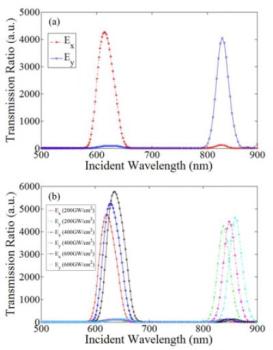Jul 21 2014
As we all know, some optical devices can only work with a certain incident polarization direction. In this case, a polarizer is necessary to shift the polarization direction of linearly polarized light.
 (a) The enhanced transmission characteristics of model with both Ex and Ey. The TEx is much stronger than TEy at the 614nm peak, while being much weaker than TEy at the 827 nm peak. (b) The transmission spectra of Ex and Ey for incident intensities of 200 GW/cm2, 400 GW/cm2 and 600 GW/cm2, respectively. The extent of transmission enhancement increases as the incident light intensity is increasing.
(a) The enhanced transmission characteristics of model with both Ex and Ey. The TEx is much stronger than TEy at the 614nm peak, while being much weaker than TEy at the 827 nm peak. (b) The transmission spectra of Ex and Ey for incident intensities of 200 GW/cm2, 400 GW/cm2 and 600 GW/cm2, respectively. The extent of transmission enhancement increases as the incident light intensity is increasing.
A common polarizer is also called half-wave plate, which constructed out of a birefringent material (such as quartz or mica). The behaviour of a half-wave plate depends on the thickness of the crystal, the wavelength of light. Considering the fabrication of crystal, a half-wave plate is difficulty to integrate on circuits. Then what kind of polarizer can be integrated on circuits? A SPPs filter may achieve this. Because of SPPs' ability to breach the diffraction limit, some devices based on SPPs are superior to traditional optical components for integrated optical circuits.
A proposed SPP-based polarization filter is composed of multiple holes array by filling it with nonlinear medium. The structure can realize polarization separation as well as filtering. As the incident light intensity varies, output characteristic is modulated. Our findings demonstrate a feasible method for constructing nanoscale optical logical gates and all-optical switches; this ability to control light with light might be helpful for integrated optical circuits and on-chip optical interconnects.